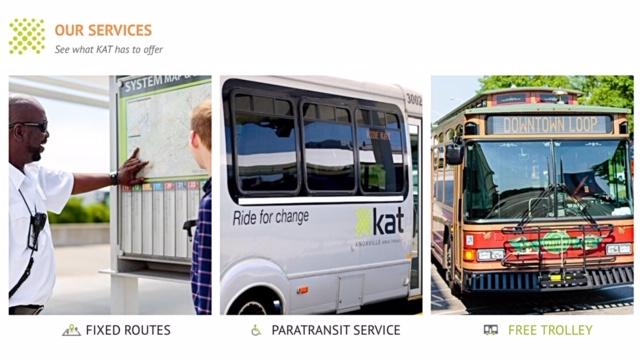Let’s talk mass transit. It is a useful way to move people in a large city. Especially in cities with a large population and congested auto traffic. It is somewhat controversial because of its high cost: just over $22 million a year here in Knoxville. And sadly, those ocean-liner-size buses are more than half-empty at times. Nonetheless, not everyone owns or drives a car, and many people rely upon buses to get to work, shopping or the doctor’s office.
One thing is clear: buses outflank trains in terms of cost, especially sunk cost, as well as practicality. Buses have flexibility in routing. They can go almost anywhere cars go. Trains can only move back and forth on a fixed track. Point A to Point B. You would probably need a car or a cab at one end or the other. Moreover, trains don’t work well in hilly landscapes. They need grades of only 1 or 2 percent … and the resulting costs of land acquisition and earthmoving mount up.
Knoxville Area Transit has some 20 routes. Three of them account for most of the usage: Broadway, Magnolia and Kingston Pike. See pie chart for details:

Image from KAT website
Cost. Let’s talk dollars. The main costs of the KAT system include the capital cost of the buses and the office and maintenance buildings; the labor cost of drivers, mechanics and administrative personnel; and the variable cost of fuel, oil, parts and tires. A fourth item is the accumulative depreciation of those expensive assets – a big number – but, to a layman at least, that seems more like how you account for the ongoing cost of buying new/or replacing worn equipment, rather than a direct out-of-pocket thing. Stuff wears out. Its value gets depreciated.
KAT has about $38 million invested in buses. That includes about 69 of the large 48-seat passenger buses, some 24 smaller 12-seater van-style buses, and 10 downtown trolleys. The buses have a roughly 12-year lifespan. A percentage depreciates in value each year, just like your car. There is another $32 million invested in longer-lasting buildings and equipment.
Labor costs (including pensions and fringes) make up the lion’s share of the annual expense: roughly $17.4 million. Fuel, parts and oil for the fleet add another $2.6 million. Administrative office operation costs, like equipment, supplies, utilities and risk management (think self-insurance), legal and contract management fees add another $2.5 million to the budget.
Revenue. Buses are clearly a subsidized service. They provide convenience for riders but they don’t make money. About $2.2 million comes in as farebox money, advance ticket purchases, and various football and shuttle rental services. The remaining nearly $20 million is subsidized through taxes at several levels. The city budget transfers some $13.2 million in operating costs to KAT each year. Federal, state and other grants cover another $8.2 million and much of that is used for purchasing buses, parts, fuel, etc.
Challenges. It remains to be seen if our political leaders can find more efficient ways of operating the bus system. Perhaps the growing number of downtown hotels and tourist venues can help sponsor some portion of the free downtown trolley service costs. Maybe some routes could eventually employ smaller buses or more efficient fuels? Perhaps a few large employers could sponsor park and ride commuter runs at rush hour for their employees? Is it time to consider leasing tasteful ads inside some buses? It is worth exploring.
Another opportunity might be to arrange to-and-from rush hour buses to the Forks of the River industrial park or other major employment locations from the main downtown terminal. That service could help inner city folks get higher paying jobs than are currently available to them if they don’t have a car.
Conclusion. As a community we need to continually evaluate the best use of our transportation system and the people it serves. Gradually, we need to add bus shelters along major routes so that weather is not an impediment to encouraging ridership. Buses, not trains, will be important to our city’s future.
Nick Della Volpe is a lawyer and a former member of Knoxville City Council.

